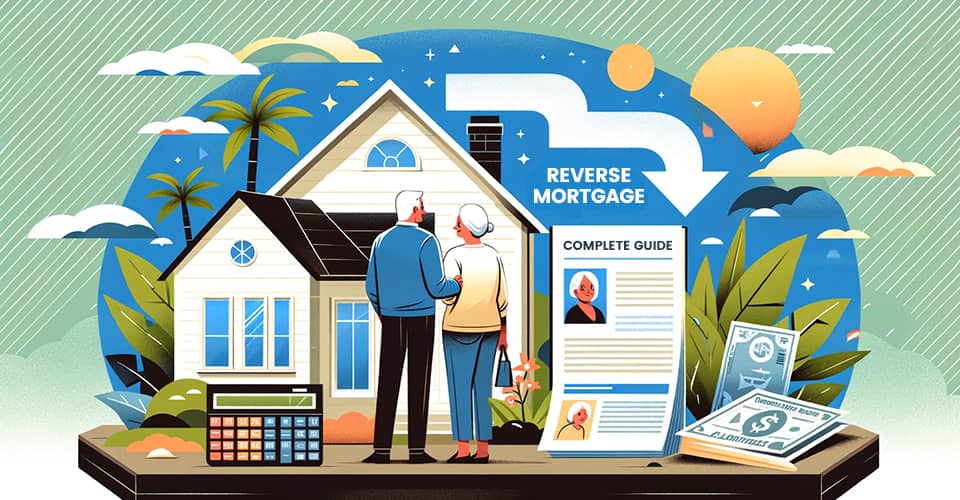Everything You Should Know About How to Purchase Reverse Mortgage
Everything You Should Know About How to Purchase Reverse Mortgage
Blog Article
Empower Your Retired Life: The Smart Means to Purchase a Reverse Mortgage
As retired life approaches, lots of people seek reliable techniques to boost their financial self-reliance and health. Among these strategies, a reverse mortgage arises as a sensible option for homeowners aged 62 and older, permitting them to touch right into their home equity without the necessity of monthly payments.
Comprehending Reverse Home Loans
Comprehending reverse home loans can be critical for homeowners seeking financial flexibility in retired life. A reverse mortgage is a financial product that allows eligible homeowners, generally aged 62 and older, to convert a portion of their home equity into cash money. Unlike typical home mortgages, where consumers make month-to-month repayments to a lending institution, reverse home loans allow property owners to receive settlements or a round figure while preserving possession of their residential or commercial property.
The amount readily available through a reverse mortgage relies on a number of elements, including the home owner's age, the home's value, and current rates of interest. Notably, the loan does not have actually to be paid off until the home owner markets the home, moves out, or dies.
It is essential for possible customers to understand the effects of this monetary product, consisting of the influence on estate inheritance, tax obligation factors to consider, and ongoing responsibilities associated with property upkeep, taxes, and insurance coverage. Additionally, counseling sessions with licensed experts are often called for to guarantee that borrowers completely comprehend the terms of the funding. Overall, a detailed understanding of reverse home loans can encourage property owners to make enlightened decisions concerning their financial future in retired life.
Benefits of a Reverse Home Mortgage
A reverse home loan offers numerous engaging benefits for qualified home owners, especially those in retirement. This economic device enables seniors to transform a section of their home equity into money, supplying vital funds without the need for month-to-month home mortgage payments. The money acquired can be made use of for numerous functions, such as covering clinical expenditures, making home renovations, or supplementing retirement revenue, thus improving total economic adaptability.
One significant advantage of a reverse mortgage is that it does not require repayment until the property owner vacates, offers the home, or dies - purchase reverse mortgage. This function allows senior citizens to keep their way of living and fulfill unanticipated expenses without the problem of month-to-month repayments. In addition, the funds obtained are usually tax-free, enabling property owners to utilize their cash without worry of tax implications
Furthermore, a reverse mortgage can supply assurance, understanding that it can serve as a monetary safeguard throughout tough times. House owners likewise keep ownership of their homes, guaranteeing they can continue living in an acquainted atmosphere. Eventually, a reverse mortgage can be a strategic economic resource, empowering retirees to handle their financial resources successfully while appreciating their golden years.
The Application Refine
Navigating the application process for a reverse home mortgage is a crucial step for homeowners considering this economic alternative. The initial stage entails examining eligibility, which typically calls for the home owner to be at the very least 62 years of ages, own the residential property outright or have a low home mortgage equilibrium, and inhabit the home as their key home.
As soon as eligibility is confirmed, homeowners must undertake a counseling session with a HUD-approved counselor. This session ensures that they totally recognize the ramifications of a reverse home mortgage, including the duties included. purchase reverse mortgage. After finishing counseling, applicants can continue to gather required documents, including proof of click to read revenue, assets, and the home's value
The following step requires submitting an application to a lending institution, that will examine the economic and property certifications. An assessment of the home will likewise be performed to establish its market price. If authorized, the loan provider will certainly present funding terms, which need to be evaluated very carefully.
Upon acceptance, the closing procedure follows, where final papers are authorized, and funds are paid out. Understanding each phase of this application process can considerably improve the homeowner's confidence and decision-making relating to reverse home mortgages.

Secret Considerations Before Buying
Investing in a reverse home loan is a significant economic decision that calls for cautious consideration of a number of key variables. Assessing your economic requirements and goals is similarly essential; determine whether a reverse mortgage lines up with your long-term strategies.

Furthermore, evaluate the effect on your present way of life. A reverse home mortgage can influence your eligibility for certain government benefits, such as Medicaid. Seek expert assistance. Consulting with a monetary consultant or a real estate therapist can supply valuable understandings tailored to your specific circumstances. By thoroughly assessing these factors to consider, you can make an extra enlightened choice regarding whether a reverse home mortgage is the appropriate monetary method for your retired life.
Making the Most of Your Funds
When you have actually safeguarded a reverse mortgage, efficiently taking care of the funds this article becomes a concern. The flexibility of a reverse home loan enables property owners to make use of the funds in various methods, but calculated preparation is important to optimize their benefits.
One key strategy is to produce a budget that details your economic goals and month-to-month expenses. By recognizing required expenditures such as health care, residential property taxes, and home upkeep, you can allocate funds appropriately to ensure long-lasting sustainability. Additionally, take into consideration making use of a portion of the funds for financial investments that can generate earnings or value in time, such as dividend-paying supplies or mutual funds.
Another crucial aspect is to preserve an emergency situation fund. Reserving a reserve from your reverse home loan can assist cover unexpected costs, offering tranquility of mind and economic security. Seek advice from with a financial expert to explore possible tax ramifications and how to integrate reverse home loan funds into your total retirement approach.
Inevitably, prudent administration of reverse mortgage funds can boost your financial security, allowing you to enjoy your retirement years without the anxiety of monetary uncertainty. Careful preparation and notified decision-making will ensure that your funds function successfully for you.
Final Thought
To conclude, a reverse home mortgage provides a sensible economic try this web-site method for seniors seeking to improve their retired life experience. By transforming home equity into accessible funds, people can deal with vital expenditures and protected additional monetary resources without incurring monthly settlements. However, mindful consideration of the connected implications and terms is vital to make best use of benefits. Inevitably, leveraging this financial tool can help with higher freedom and enhance total lifestyle throughout retirement years.
Comprehending reverse mortgages can be vital for home owners seeking monetary versatility in retirement. A reverse home mortgage is an economic product that permits qualified property owners, typically aged 62 and older, to transform a part of their home equity into money. Unlike traditional home mortgages, where customers make month-to-month settlements to a lending institution, reverse mortgages allow homeowners to get payments or a lump amount while preserving ownership of their residential property.
Overall, an extensive understanding of reverse home loans can empower property owners to make educated decisions about their economic future in retired life.
Consult with a monetary advisor to check out possible tax ramifications and exactly how to incorporate reverse home loan funds into your general retired life technique.
Report this page